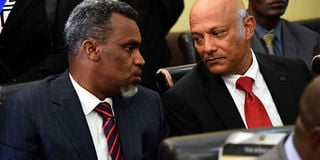The illusion that is Kenya's war against corruption

Director of Public Prosecution Noordin Haji (left) and Ethics and Anti-Corruption Commission Chief Executive Officer Twalib Mbarak converse during the swearing-in of Inspector General of Police Hillary Mutyambai at the Supreme Court on April 8, 2019. The two are leading the fight against graft. PHOTO | FILE | NATION MEDIA GROUP
What you need to know:
- The President has made various orders, tough talk and rallying calls to garner public support in the war against graft, but the real results remain anyone’s guess.
- Archbishop Jackson ole Sapit recently made an about-turn after criticising churches for allowing politicians to clean dirty money on the pulpit through donations.
The release of the “state capture” report has once again punctured public confidence in the ongoing war against corruption, almost a year after President Uhuru Kenyatta gave a definitive speech on Madaraka Day.
The report by Africa Center for Open Governance (Africog) portrays a scenario where the government operates in two-faced conflicted operations with one arm running the formal and the other operating the informal State, all in an effort to make private profits and hoodwink the public that something is going on.
The group says Kenya has joined the ranks of a captured state where the corrupt steal, use the loot to win public confidence through generous contributions, ascend to power and devise more schemes to milk the country further.
According to Africog, narrative control is essential in the mechanics of state capture to keep the public hopeful that there are efforts to eliminate the corrupt class but which only “makes motion with no movement”.
“These arrests have generated much excitement, which is premature. Kenya’s prosecution-driven anti-corruption strategy has always been rather benign; it is ‘capture-mark-release’, a little like ecological methods of estimating the population in an ecosystem,” the report released on Tuesday reads in part.
UHURU'S QUEST
The report lists several arrests and court appearances of people accused of corruption and whose cases have either been crumbling or becoming diluted as part of the knee-jerk reactions to keep the war alive.
President Kenyatta, who will be addressing the nation on Saturday during Madaraka Day celebrations, has become the new face in the fight against corruption.
In the past one year, the President has made various orders, tough talk and rallying calls to garner public support in the war against graft, but the real results remain anyone’s guess.
From the June 14 order that all public officers are to undergo a lifestyle audit to the suspension of heads of procurement and accounting units in ministries, departments, agencies and State corporations for scrutiny, including a lie detector test, the President has been consistent in the calls.
TOUGH TALK
His last Madaraka Day speech was no less fiery. He called on the war against corruption to be fought just like the colonialists were fought and asked the public to stop glorifying the corrupt.
“We know of teachers who impregnate students. Preachers who swindle their flock. Lawyers who defraud clients. Architects [who] build houses using shortcuts leading to collapse of buildings. Doctors [who] give false diagnoses to increase their fees and pharmacies who sell fake medicines.
"Unfortunately, these crooks have become heroes. Too often, some of the worst rogues are welcomed back home like conquering celebrities,” the President said in a conscience-pricking address.
Constitution lawyer Wachira Maina, who co-authored the report, says the glorifying of corrupt leaders is a well-designed scheme by the looters who first ensure they have made enough philanthropic offers that would make anyone fighting them the enemy.
A donation to build a church, taking an orphaned child to school, offering funeral sponsorship, paying medical bills and supplying free food to the poor make a corrupt leader “cleaner” and more acceptable. It is part of the survival strategy, according to Mr Maina.
CHURCH DONATIONS
Head of Anglican Church of Kenya Archbishop Jackson ole Sapit recently made an about-turn after criticising churches for allowing politicians to clean dirty money on the pulpit through donations.
Weeks later, the clergyman said the church was not opposed to donations but only wanted the politicians to watch their tongues when they take to the pulpit.
The activists laid out an elaborate strategy that keeps the corrupt sacred and untouchable, with key institutions either weakened or weaponised against the perceived enemies of the club largely comprising rich businessmen and powerful politicians.
To make the protectionism transition into new regimes, a political pact is made before election and the same clique morphs into a new wave of reformists through new political outfits before winning elections and protecting their peers.
They then begin the knee-jerk motion without movement cycle to prove to the public that something is happening again.
EXHAUSTION
Vertically, the network is organised in such a way that the juniors are allowed to be corrupt as well, but for two reasons: embrace the consequence and channel proceeds up the food chain.
“You cannot afford to have unhappy juniors in the system. It ensures posterity of the scheme when you capture the cow and the cop, it means you can continue milking without anyone disturbing you,” economist David Ndii said.
The only hope, according to the anti-corruption crusaders, will happen when the corruption curve hits the peak and resources become too little to share, then key elements of the support defect to create an anti-corruption crusade.
The other way to liberate Kenyans would involve a fiscal crisis which leaves everyone exposed, hence a fight from within, with the support of an angry public pushed to the wall.





